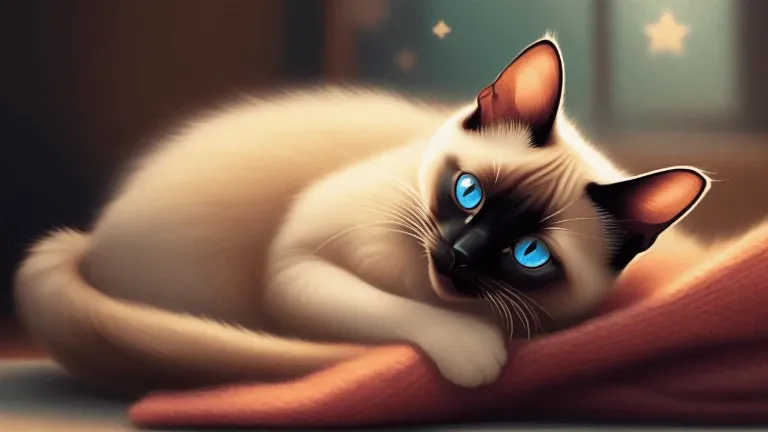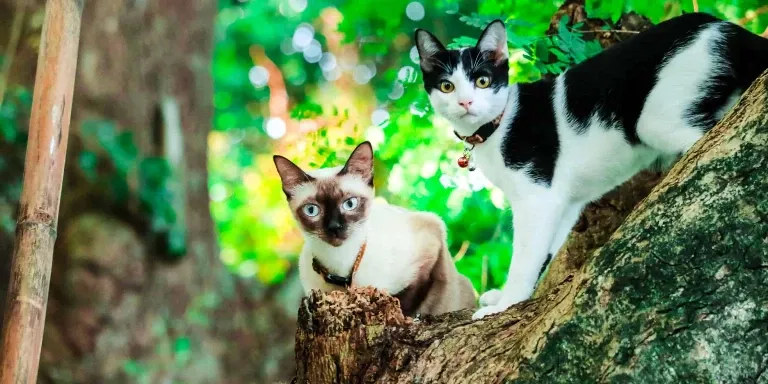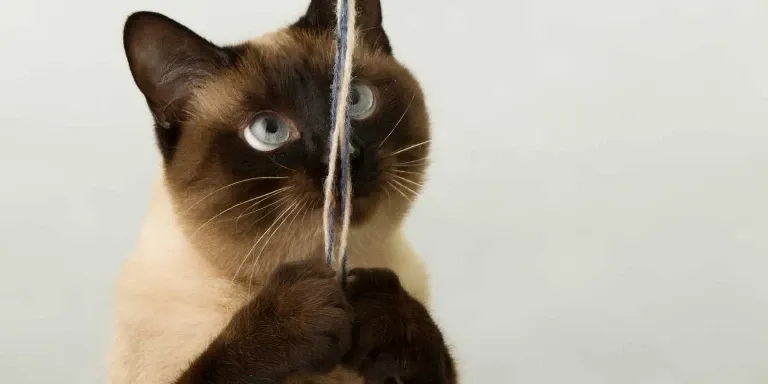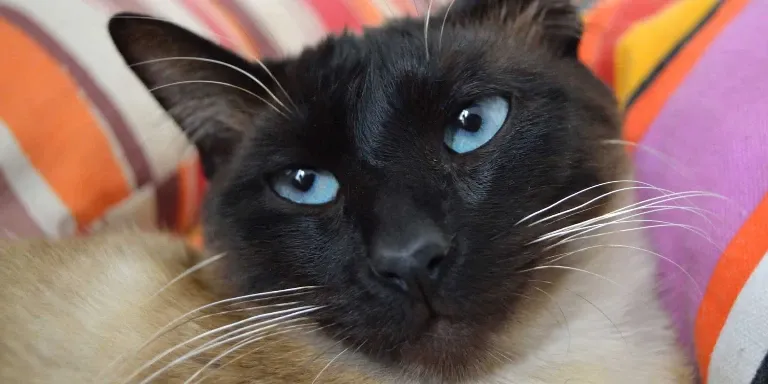The Best Fluffy Pancakes recipe you will fall in love with. Full of tips and tricks to help you make the best pancakes.
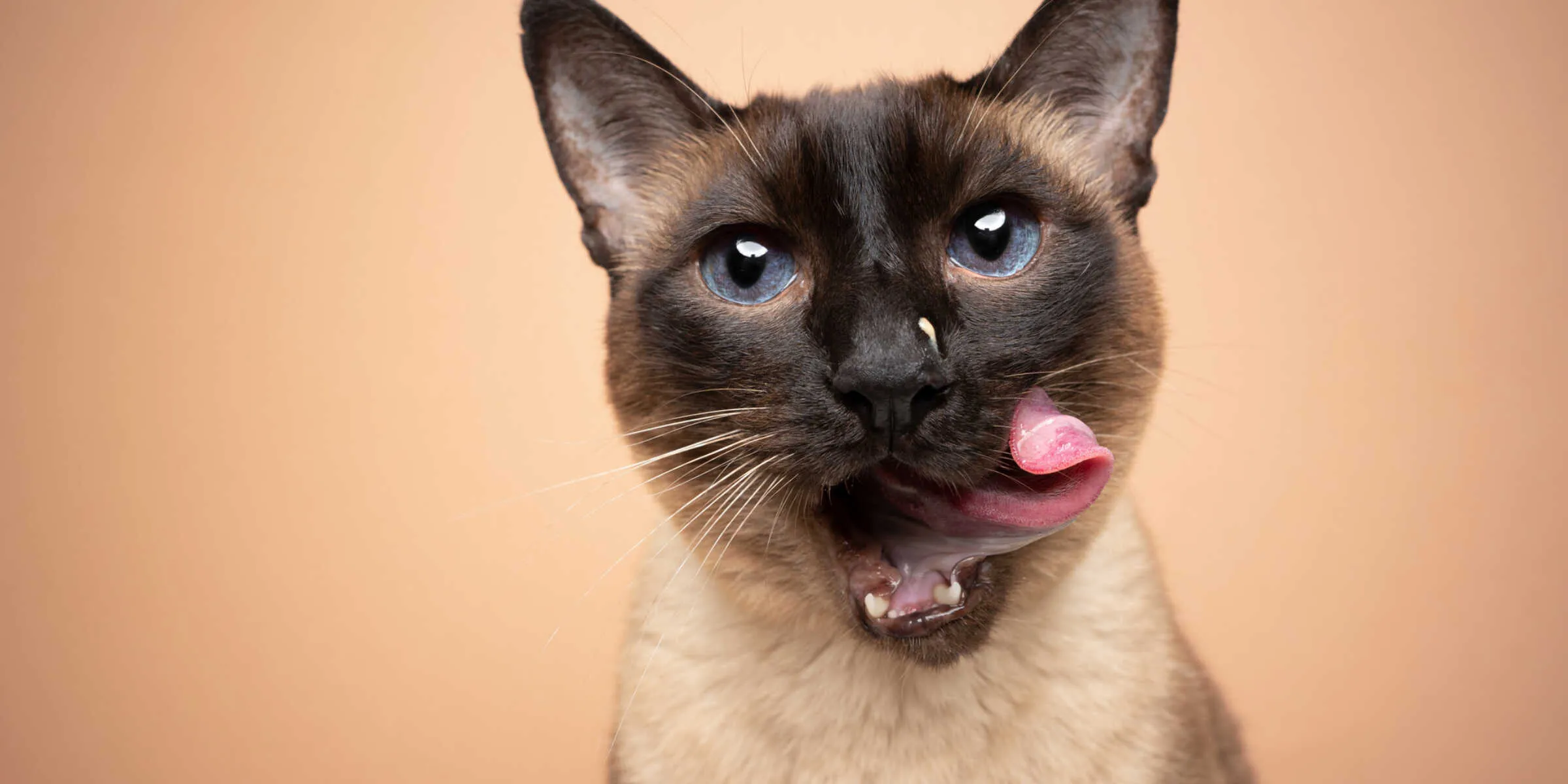
Do you find yourself hesitant to adopt a Siamese cat because of their reputation? It’s not uncommon to hear negative comments about this breed, but have you ever stopped to wonder why?
Siamese cats have historically had a bad reputation due to their vocal nature and tendencies towards being territorial and demanding attention. However, this reputation is largely undeserved and outdated. With proper training and socialization, Siamese cats can make loving and loyal pets.
In this article, we’ll explore the history and personality traits of Siamese cats, common misconceptions, and the factors that contribute to their bad reputation. By the end, you’ll have a better understanding of these felines and be able to make an informed decision about whether a Siamese cat is the right pet for you.
Siamese cats have a long and fascinating history, dating back to ancient Siam (now Thailand) where they were prized for their beauty and grace. However, over time, their reputation has become tarnished in the eyes of some.
You may have heard that Siamese cats are aggressive, loud, and difficult to train. But is this really true? In the following sections, we’ll delve into the facts and fiction surrounding Siamese cats to give you a more accurate picture of this unique breed.
History of Siamese Cats
You’re probably wondering where Siamese cats come from and how they ended up with their unique appearance and personality.
The origins of Siamese cats can be traced back to ancient Siam, now known as Thailand. These cats were highly regarded in Siam and were even given the status of royal cats and were kept in the palace. It was believed that they had a spiritual significance.
The unique appearance of Siamese cats can be attributed to genetic mutations that occurred in their native land. The breed was first introduced to the Western world in the late 1800s and quickly gained popularity due to their striking appearance. However, this newfound popularity also led to the breeding of Siamese cats without regard for their health or temperament, which may have contributed to their bad reputation.
Siamese cats have a cultural significance in Thailand, where they are known as Wichianmat. They are considered to be a symbol of good luck and are often given as gifts to celebrate special occasions.
Despite their bad reputation in some parts of the world, Siamese cats continue to be beloved pets in many households and are known for their intelligence, playfulness, and loyalty.
Personality Traits
Boy, those felines sure are a feisty bunch! Siamese cats have a bad reputation due to their distinctive personality traits. While some find their temperament charming, others may find it overwhelming.
One of the main reasons for their difficult reputation is their strong-willed and vocal personality. They’re not afraid to speak their minds and let you know when they’re unhappy. This may appear stubborn or demanding, but it’s simply a part of their breed standards.
Another contributing factor is their tendency to become overly attached to their owners, leading to possessive behavior like biting or scratching when they feel threatened or jealous. Despite this, Siamese cats are extremely loyal and affectionate.
It’s important to remember that their temperament differences are a part of their breed standards. With patience and understanding, they make wonderful companions. If you’re looking for a feline friend full of personality, a Siamese cat may be just what you need!
Common Misconceptions
You may have heard that Siamese cats are aggressive, high-maintenance, and incompatible with other pets. However, these are all common misconceptions.
While Siamese cats are known for being vocal and active, they’re not inherently aggressive. They do require some extra attention and grooming, but they’re not necessarily high-maintenance. And while they may prefer to be the only cat in the household, they can get along with other pets if properly introduced and socialized.
Aggressiveness
It’s no secret that Siamese cats have a reputation for being aggressive, causing fear and hesitation in those considering adopting one. However, aggression in Siamese cats is not inherent, but instead caused by a variety of factors.
One common cause of aggression in Siamese cats is a lack of socialization as kittens. Without proper socialization, Siamese cats can become fearful and defensive, leading to aggressive behavior.
Another cause of aggression in Siamese cats is boredom and frustration. Siamese cats are known for their high energy levels and need for stimulation. Without enough mental and physical activity, they may become restless and resort to aggressive behavior as a means of releasing pent-up energy.
To combat this, owners should provide plenty of toys, scratching posts, and playtime to keep their Siamese cats mentally and physically stimulated. Additionally, techniques for handling aggression in Siamese cats include positive reinforcement training and redirecting their attention with toys or treats.
With proper socialization, stimulation, and training, Siamese cats can make loving and loyal companions.
High Maintenance
Maintaining a Siamese cat’s coat can be time-consuming, as their fine fur requires frequent grooming to prevent matting and hairballs. However, the bond you build with your feline friend during grooming sessions can be incredibly rewarding. Spending time with your cat while brushing and grooming them can be a special bonding experience.
If you have a Siamese cat, you should be aware of their grooming needs. Here are some things to keep in mind:
- Brush your Siamese cat’s coat daily to prevent matting and hairballs.
- Bathe your cat occasionally to keep their coat clean and healthy.
- Trim their nails regularly to prevent them from getting too long.
- Feed your cat a diet that’s high in protein to keep their coat healthy and shiny.
In addition to their grooming needs, Siamese cats also have specific dietary requirements. By providing your cat with the proper nutrition and grooming, you can ensure that they lead a happy and healthy life.
Incompatibility with Other Pets
Living with a Siamese cat may pose some challenges if you already have other pets in your home. As highly territorial animals, Siamese cats can become aggressive towards other animals that they perceive as a threat. This can lead to conflicts and tension between pets, making it difficult for them to coexist peacefully under one roof.
Introducing new pets to a household with a Siamese cat requires careful planning and patience. It’s important to introduce new pets gradually, allowing them to get used to each other’s scents and presence before introducing them face to face. Even then, there may be behavioral issues that arise, such as hissing, growling, or scratching.
It’s important to monitor the cats’ interactions closely and seek advice from a veterinarian or animal behaviorist if necessary. Ultimately, with proper introduction and training, it is possible for Siamese cats to live harmoniously with other pets.
Factors that Contribute to Negative Reputation
You may wonder, why do people often assume Siamese cats are aggressive or aloof? While it’s true that these cats can be vocal and demanding, there are several factors that contribute to their negative reputation.
Here are some reasons why Siamese cats are often misunderstood:
- Breed discrimination: Some people simply don’t like Siamese cats because of their distinctive appearance or personality traits. This type of discrimination can be seen in the way that certain breeds are favored over others, and it’s often based on subjective opinions rather than objective facts.
- Cultural stereotypes: Siamese cats are often associated with exoticism or foreignness, which can lead to cultural stereotypes and misunderstandings. For example, some people may assume that all Siamese cats are aggressive or unpredictable because they come from a different part of the world.
- Lack of socialization: Like any other animal, Siamese cats need proper socialization and training in order to behave well around people and other pets. When they don’t receive this kind of attention, they may become anxious, aggressive, or aloof.
- Misunderstood body language: Siamese cats are known for their expressive body language, but this can also be misinterpreted by humans who don’t understand their signals. For example, a Siamese cat who is kneading or purring may be interpreted as aggressive or dominant, when in fact they are simply showing affection.
Overall, it’s important to recognize that Siamese cats are unique individuals with their own personalities and needs. While some may have a more demanding or vocal nature, this doesn’t necessarily mean that they are aggressive or aloof. By treating them with patience and understanding, we can help break down the negative stereotypes that surround this breed.
Positive Aspects of Siamese Cats
If you’re considering getting a Siamese cat, you’ll be happy to know that they have some positive traits.
First, they are known for their loyalty and often bond closely with their owners.
They’re also an affectionate breed and enjoy snuggling up with their humans.
Finally, Siamese cats are intelligent and trainable, making them a good choice for those who want a feline companion that can learn tricks and follow commands.
Loyalty
Hey, did you know that when it comes to loyalty, Siamese cats are actually quite devoted to their human companions? Despite their reputation for being aloof and independent, Siamese cats can be extremely affectionate and loyal pets.
They often form strong bonds with their owners and are known to follow them around the house, snuggle up with them on the couch, and even sleep with them at night. Siamese cat owners have reported that their pets are fiercely loyal and will go to great lengths to protect them.
They are also very intuitive and seem to have a sixth sense when it comes to detecting their owner’s moods and emotions. If you’re feeling sad or upset, your Siamese cat may curl up in your lap and offer you comfort and affection.
Overall, while Siamese cats may have a bad reputation in some circles, their loyalty and devotion to their human companions can’t be denied.
Affectionate Nature
The affectionate nature of Siamese felines is like a warm, cozy blanket on a chilly winter night. These cats are known for being highly social and loving towards their owners. They often crave attention and will follow you around the house, wanting to be involved in everything you do.
Siamese cats are notorious for being ‘lap cats,’ meaning that they love to snuggle up on your lap and purr contentedly. They’re also known for their distinctive vocalizations, which they use to communicate with their owners.
One of the keys to building a strong bond with a Siamese cat is through training methods and bonding techniques. These cats are highly intelligent and can be trained to do a variety of tricks and behaviors. Positive reinforcement is the most effective way to train a Siamese cat, as they respond well to praise and rewards.
Additionally, spending quality time with your cat and engaging in interactive play is crucial for building a strong bond. Overall, the affectionate nature of Siamese cats is a wonderful trait that makes them beloved pets for many people.
Trainability
Training Siamese felines is a joy because they’re highly intelligent and respond well to positive reinforcement. Their intelligence makes them quick learners, and they’ll always be willing to learn new tricks and behaviors. Siamese cats are also highly motivated by treats and praise, which makes training them even more rewarding.
When it comes to training methods, it’s important to note that Siamese cats respond best to positive reinforcement. Punishing them for bad behavior will only make them fearful and anxious, which can lead to further behavioral issues. Instead, focus on rewarding them when they exhibit positive behavior.
This can be done through treats, toys, or verbal praise. With patience and consistency, you can teach your Siamese cat a variety of tricks and behaviors, making them a well-behaved and happy companion.
Considerations for Potential Owners
Before you decide to bring a Siamese cat into your home, it’s important to consider the adage ‘look before you leap’ and do your research on their unique personality and needs.
One of the most important factors to consider is lifestyle compatibility. Siamese cats are very active and social creatures, so they require a lot of attention and stimulation. If you have a busy schedule or prefer a more laid-back lifestyle, a Siamese cat may not be the best fit for you.
Another consideration for potential owners is grooming requirements. Siamese cats have short, fine fur that is easy to maintain, but they do shed quite a bit. You’ll need to brush them regularly to keep their coat looking shiny and healthy. Additionally, Siamese cats are prone to dental problems, so you’ll need to make sure you’re providing them with proper dental care, such as regular teeth cleanings and dental chews.
Overall, Siamese cats can make wonderful pets, but they do require a bit of extra work and attention. Before you decide to bring one into your home, make sure you’re prepared to meet their unique needs. If you’re willing to put in the effort, you’ll be rewarded with a loving and loyal companion that will bring you years of joy and companionship.
Tips for Owning a Siamese Cat
If you’re considering owning a Siamese cat, it’s important to know that socialization is key to their happiness and well-being. They thrive on human interaction and may become anxious or destructive if left alone for long periods.
Providing them with regular exercise and playtime is also crucial, as they’re known for their high energy levels and need for activity.
Additionally, mental stimulation through toys and games can help prevent boredom and keep them mentally sharp.
Socialization
When socialized properly, Siamese cats are affectionate and loyal pets. It’s important to start socializing your Siamese cat at a young age through positive interactions with people and other animals. This will help them develop positive associations with socialization and become comfortable in different environments.
Here are three ways to socialize your Siamese cat:
- Introduce your Siamese cat to new people and animals gradually and in a controlled environment, such as a quiet room in your home.
- Use positive reinforcement, such as treats or toys, to reward your Siamese cat for good behavior during socialization.
- Behavior modification techniques, such as desensitization and counter-conditioning, can be used to help adult Siamese cats overcome any negative associations they may have with socialization.
By properly socializing your Siamese cat, you can prevent them from developing any negative behaviors or reputations. Remember to always be patient and consistent in your socialization efforts, and your Siamese cat will become a happy and well-adjusted pet.
Exercise and Play
To keep your Siamese cat healthy and happy, you’ll want to make sure they get plenty of exercise and playtime. Siamese cats are known for being active and curious, so they need a lot of stimulation to keep them from getting bored.
Interactive toys, such as puzzle feeders and laser pointers, can provide mental and physical exercise for your cat. These toys encourage your cat to use their problem-solving skills and can help them burn off excess energy.
Outdoor activities can also be a great way to keep your Siamese cat active. However, it’s important to remember that Siamese cats are prone to getting lost or injured outdoors. If you do decide to take your cat outside, make sure to supervise them at all times and keep them on a leash or in a secure enclosure.
You can also create an indoor play area for your cat, with climbing structures and scratching posts, to encourage them to stay active and entertained. By providing your Siamese cat with plenty of exercise and playtime, you can help them maintain a healthy weight and prevent behavior problems caused by boredom and anxiety.
Mental Stimulation
Now that you know how important exercise is for your Siamese cat, it’s time to talk about mental stimulation. Siamese cats are known for their active and curious personalities, and they need mental stimulation to keep them happy and healthy.
One way to provide mental stimulation for your Siamese cat is through cat toys. Toys that move and make noise, such as balls and feather wands, can engage your cat’s natural hunting instincts and provide hours of entertainment.
Puzzle feeders are another great way to provide mental stimulation for your cat. These feeders require your cat to work for their food, which can help prevent boredom and keep them mentally sharp.
With a variety of toys and feeders available, you can find the perfect ones that suit your cat’s personality and keep them mentally stimulated.
Are the Negative Traits of Siamese Cats the Reason for Their Bad Reputation?
Many people are wary of owning a Siamese cat due to the perceived cons of Siamese cat – their reputation for being vocal, demanding, and prone to separation anxiety. While these negative traits can be challenging, proper training and socialization can help mitigate these behaviors and foster a loving relationship.
Conclusion
Congratulations on finishing this informative article on Siamese cats! Now that you’ve learned about their history, personality traits, and common misconceptions, you may wonder why they have a bad reputation.
Factors such as their vocal nature and tendency towards jealousy can contribute to negative opinions, but it’s important to remember that every cat is unique and should be judged as an individual.
While Siamese cats may not be for everyone, they also have many positive aspects such as their intelligence, loyalty, and affectionate nature.
If you’re considering adding a Siamese cat to your family, be sure to do your research and consider factors such as their high energy levels and need for attention. With proper care and attention, a Siamese cat can make a wonderful companion.
So go ahead, open your heart to these beautiful and unique felines.

